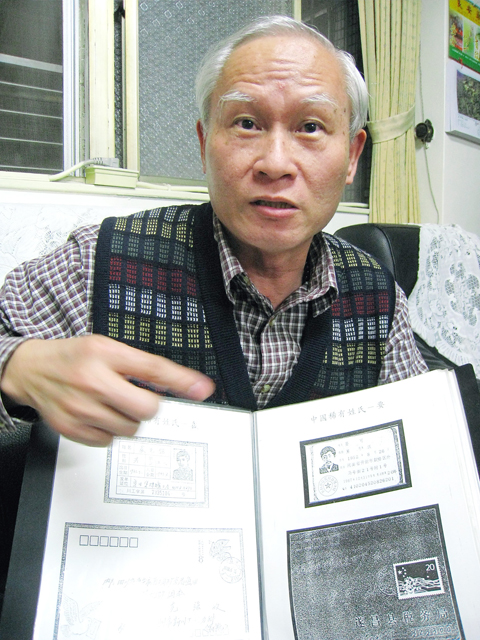A man who once was an avid stamp collector has turned his energies toward a different kind of collectible — surnames. Over the past decade, he has collected more than 200 rare Chinese surnames from friends, relatives, coworkers and even strangers he found in a telephone directory.
Kuo Chih-hsiang (郭智祥) collects surnames by sending an envelope to a person with an unusual surname and have him or her write back with a photocopy of any document that can prove that person’s identification.
Kuo said his surname collection began more than 10 years ago when he asked a Chinese man, Yao Ke (要可), with whom he intended to exchange stamps at the time, to prove his unusual family name. A month later, Kuo received a copy of Yao’s ID card via mail, which inspired him to start collecting rare Chinese surnames.

PHOTO: YANG JIOU-YIN, TAIPEI TIMES
At first, Kuo collected unusual surnames from friends who were also stamp collectors by exchanging postal products. Later, he started looking up strange surnames in a telephone directory. However, by doing so, he said he scared many people as he insisted on obtaining photocopies of their ID cards. At long last, he began accepting other types of identification, such as driver’s licenses, student IDs, diplomas, club membership cards, hospital receipts and even bank statements.
To complete the process, Kuo said he would first ask a person with a rare family name for his or her address and then send them a self-stamped envelope. After that, he would either visit in person to pick up the envelope or have the person mail it back.
Some of the rare surnames Kuo has collected include Hu (虎, tiger), Yi (蟻, ant), Shui (水, water), Yun (雲, cloud), Suo (鎖, lock), Dan (但, but) and Mai (買, buy).
Some of the surnames were so rare that the character could not be found on a computer, he said.
Pang Shou-neng (逄守能), a local postmaster in Taichung City, remembered that Kuo had to travel from Taipei to Taichung to meet him to pick up the necessary information for his collection.
“Seeing him so committed, I decided to make friends with him,” Pang said. “But since scams have become so prevalent, if he had asked me for a copy of my ID back then, I wouldn’t have given it to him.”
An elderly woman surnamed Tse (策) told Kuo that very few people had the surname Tse, adding that she was worried it would soon become extinct.
Kuo said this made him realize that his efforts were valuable.

An essay competition jointly organized by a local writing society and a publisher affiliated with the Chinese Communist Party (CCP) might have contravened the Act Governing Relations Between the People of the Taiwan Area and the Mainland Area (臺灣地區與大陸地區人民關係條例), the Mainland Affairs Council (MAC) said on Thursday. “In this case, the partner organization is clearly an agency under the CCP’s Fujian Provincial Committee,” MAC Deputy Minister and spokesperson Liang Wen-chieh (梁文傑) said at a news briefing in Taipei. “It also involves bringing Taiwanese students to China with all-expenses-paid arrangements to attend award ceremonies and camps,” Liang said. Those two “characteristics” are typically sufficient

A magnitude 5.9 earthquake that struck about 33km off the coast of Hualien City was the "main shock" in a series of quakes in the area, with aftershocks expected over the next three days, the Central Weather Administration (CWA) said yesterday. Prior to the magnitude 5.9 quake shaking most of Taiwan at 6:53pm yesterday, six other earthquakes stronger than a magnitude of 4, starting with a magnitude 5.5 quake at 6:09pm, occurred in the area. CWA Seismological Center Director Wu Chien-fu (吳健富) confirmed that the quakes were all part of the same series and that the magnitude 5.5 temblor was

The brilliant blue waters, thick foliage and bucolic atmosphere on this seemingly idyllic archipelago deep in the Pacific Ocean belie the key role it now plays in a titanic geopolitical struggle. Palau is again on the front line as China, and the US and its allies prepare their forces in an intensifying contest for control over the Asia-Pacific region. The democratic nation of just 17,000 people hosts US-controlled airstrips and soon-to-be-completed radar installations that the US military describes as “critical” to monitoring vast swathes of water and airspace. It is also a key piece of the second island chain, a string of

The Central Weather Administration has issued a heat alert for southeastern Taiwan, warning of temperatures as high as 36°C today, while alerting some coastal areas of strong winds later in the day. Kaohsiung’s Neimen District (內門) and Pingtung County’s Neipu Township (內埔) are under an orange heat alert, which warns of temperatures as high as 36°C for three consecutive days, the CWA said, citing southwest winds. The heat would also extend to Tainan’s Nansi (楠西) and Yujing (玉井) districts, as well as Pingtung’s Gaoshu (高樹), Yanpu (鹽埔) and Majia (瑪家) townships, it said, forecasting highs of up to 36°C in those areas